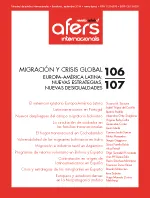Spanish recruitment programmes for Latin Americans in countries of origin: a flexible management framework

In the past decade, countries whose markets needed seasonal labour have sought new ways of importing foreign workers through channelling and recruitment programmes in countries of origin. This article seeks to demonstrate that, in the case of Spain, the effective development of this process has only been possible because of a flexible and dynamic system in which bilateral agreements have played a major role, among them those signed with some Latin American countries. Flexible management of these programmes has been implemented via legislation, via the institutions and actors involved, and via the immigrants themselves, who have managed (or been forced) to adapt to the changes of a labour market conditioned by the globalisation of labour and capital.
Key words: seasonal workers, circular migration, Latin America
>> The full text articles of this issue are available only in Spanish language